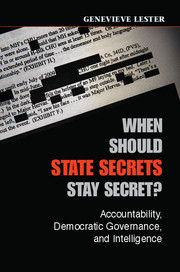Description
When Should State Secrets Stay Secret?
Accountability, Democratic Governance, and Intelligence
Author: Lester Genevieve
This book examines modern trends in intelligence oversight development and how these mechanisms bolster an internal security system, increasing the secrecy of the intelligence enterprise.
Language: English
Subject for When Should State Secrets Stay Secret?:
Approximative price 93.25 €
In Print (Delivery period: 14 days).
Add to cart
When Should State Secrets Stay Secret?
Publication date: 05-2015
248 p. · 15.8x23.5 cm · Hardback
Publication date: 05-2015
248 p. · 15.8x23.5 cm · Hardback
Approximative price 35.19 €
In Print (Delivery period: 14 days).
Add to cart
When Should State Secrets Stay Secret?
Publication date: 05-2015
252 p. · 15x22.6 cm · Paperback
Publication date: 05-2015
252 p. · 15x22.6 cm · Paperback
Description
/li>Contents
/li>Biography
/li>
Contrary to popular assumption, the development of stronger oversight mechanisms actually leads to greater secrecy rather than the reverse. When Should State Secrets Stay Secret? examines modern trends in intelligence oversight development by focusing on how American oversight mechanisms combine to bolster an internal security system and thus increase the secrecy of the intelligence enterprise. Genevieve Lester uniquely examines how these oversight mechanisms have developed within all three branches of government, how they interact, and what types of historical pivot points have driven change among them. She disaggregates the concept of accountability into a series of specified criteria in order to grapple with these pivot points. This book concludes with a discussion of a series of normative questions, suggesting ways to improve oversight mechanisms based on the analytical criteria laid out in the analysis. It also includes a chapter on the workings of the CIA to which a number of CIA officers contributed.
1. An analytical approach: intelligence, accountability and oversight; 2. Organizing secrecy: the CIA and institutional control; 3. External accountability: the development of congressional oversight; 4. Congress and oppositional oversight; 5. An independent judiciary? The domestic implications of intelligence and the politics of secret oversight; 6. Conclusions.
Genevieve Lester is a research fellow and lecturer at the University of California, Washington Center, and a non-resident fellow at the Center for Strategic and International Studies in Washington DC. She was a visiting assistant professor and coordinator of intelligence in the School of Foreign Service, Georgetown University, Washington DC, and a senior fellow at the Center for Security Studies also at Georgetown. Her areas of interest are international relations and security with an emphasis on intelligence and accountability.
© 2024 LAVOISIER S.A.S.




